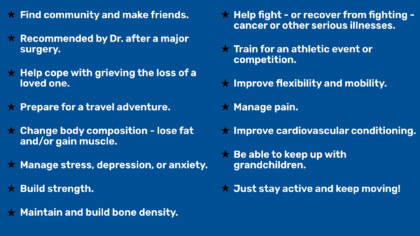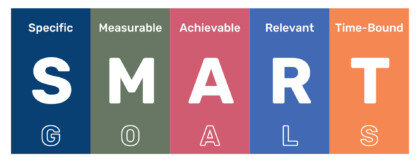News & Updates
Finding Your WHY and Achieving Your Goals

The Importance of WHY
There are infinite reasons and motivations to exercise. (Almost) none are bad.
Identifying and tapping into your WHY is key to getting started on a regular exercise program, and staying motivated over time.
For some of us, identifying our WHY (or WHYs) is effortless. Others might need to do a little work to tease things out. But even for the most focused and determined among us, it’s valuable to periodically spend a little time thinking about your WHY(s) and what makes them so important to you.
Here is a brief list of just some of the things our members have cited to us as their catalyst for coming to Chatham Works.

Many of these are personal motivations that relate to quality of life, while others are focused more on concrete goals or outcomes. All are great reasons to get into the gym and embrace regular exercise.
Finding Your WHY
Ultimately we can all benefit from taking some time to define both the destination and why you want to get there.
Here’s a simple exercise to help you identify both:
“I want to X because Y.”
X is your goal or destination, and Y is your WHY.
Try it. Whichever end the equation you start on is up to you. There’s no “wrong” answer or approach here. But regardless of which way you come at it, your goal(s) and your WHY(s) should be aligned, and reassessed over time.
Goal Setting for Success
Knowing and remembering your WHY is crucial. But simply wanting to affect some kind of change in your life probably won’t get you anywhere. Whether you’re aiming to lose weight, improve your conditioning, build strength, reduce stress, or improve your overall well-being, having concrete and achievable goals that are aligned with your WHY is key to getting to where you want to be.
When combined with the SMART model, goal-setting becomes even more powerful.

SMART is an acronym that stands for Specific, Measurable, Achievable, Relevant, and Time-bound. These simple criteria help structure your goals, making them more manageable, and more attainable.
The Benefits of Setting SMART Goals
Incorporating SMART goals into your wellness journey can be a game changer. Here’s why:
1. SPECIFIC Goals Bring Clarity
When setting health and fitness goals, it’s easy to fall into the trap of vague objectives like “I want to get fit” or “I want to eat healthier”. The problem with such statements is that they lack direction and focus. By making your goals specific, you eliminate ambiguity by giving yourself a clear target.
For example, instead of saying, “I want to lose weight,” a healthy SMART goal would be: “I want to reduce my body fat percentage by 5% in the next six months by exercising four times a week and reducing my daily caloric intake by 300 calories.” This clarity helps you understand exactly what needs to be done to reach your target, making it easier to create an actionable plan.
➔ Why it matters: Setting specific goals in health and wellness allows you to break down larger ambitions into actionable steps, making it less overwhelming and increasing your chances of success.
2. MEASURABLE Goals Track Progress
A goal without a way to measure success is like running a race with no finish line. By making your goals measurable, you can track your progress and see how far you’ve come. This is a powerful motivator, especially in health and fitness where tangible results take time.
For instance, if your goal is to improve your cardiovascular health, a measurable goal might be: “I will row 2,000 meters in under 10 minutes within eight weeks.” This provides a clear metric (time to row 2,000 meters) that can be measured and tracked over time. Being able to gauge your progress helps you stay focused and provides a sense of accomplishment.
Measurable goals also invite you to continue to challenge yourself further. Did you hit your 10 minute goal for a 2000 meter row? Awesome! Now shoot to finish in under 9 minutes and 45 seconds!
Or if it turns out that 10 minutes might be an unrealistic near-term goal, dial it back to something more achievable, like 10 minutes and 30 seconds. Then revisit the 10 minute goal after you’ve hit that target. There’s a lot to be said for getting a few wins under your belt as you work towards something more challenging.
It’s important to note that your goal doesn’t need to be related to some kind of athletic achievement. Even a less specific goal like “just keep active” can be translated into something measurable, like “I will earn at least 1,300 Myzone Effort Points every month.”
➔ Why it matters: Measuring progress keeps you motivated and allows for adjustments in your plan if you’re not seeing the results you want.
3. ACHIEVABLE Goals Set You Up for Success
Setting goals that are overly ambitious can lead to frustration and burnout. On the other hand, goals that are too easy might not push you to grow. SMART goals require that your objectives are achievable, meaning they should challenge you while remaining realistic.
For example, if you currently don’t exercise much, setting a goal to work out every day for an hour might be too daunting, or lead to burnout. A more achievable goal could be: “I will start by exercising for 30 minutes three times a week, and gradually increase the time and frequency over the next two months.” This more sensible goal respects your current fitness level while still challenging you to improve.
➔ Why it matters: Realistic goals reduce the risk of failure and disappointment, helping you build confidence and maintain momentum.
4. RELEVANT Goals Align with Your Personal Vision
Your goals should matter to you on a personal level, and reflect your WHY. Having goals that align with your WHY will increase your commitment and make the journey more fulfilling and relevant.
For instance, if you suffer from depression, a great goal could be “I will take high intensity interval training classes two times a week to boost endorphins, dopamine, and endocannabinoids, and thereby improve my mental health.”
This goal connects your fitness journey to something deeply meaningful in your life, increasing the likelihood that you’ll stay dedicated.
➔ Why it matters: Relevant goals are easier to stick with because they are tied to your WHY - your core values and aspirations in life.
5. TIME-BOUND Goals Create Urgency
A goal without a deadline can easily fall by the wayside. Adding a time frame to your health and fitness goals creates a sense of urgency and helps you prioritize them. It’s much harder to procrastinate when you’ve set a clear timeline for yourself.
For instance, instead of saying, “I want to improve my flexibility,” a time-bound version would be: “I want to be able to touch my toes in the next 60 days by taking Yoga classes three times a week.” This deadline motivates you to take consistent action and keeps you accountable.
➔ Why it matters: Deadlines create a sense of urgency, pushing you to take action rather than putting off your goals indefinitely.

What’s Your Plan?
Let's say you have a goal that reflects your WHY. Mapping out actionable steps to get you to where you want to be is the next piece of the puzzle. Having a destination in mind but no concrete plan to get there is unlikely to lead to success.
You need a plan. (And usually one that encompasses exercise, recovery, and diet.)
This is where many of us - even longtime gym-goers - fall flat. Coming into the gym and grinding out a workout 5+ days a week is great. (And if it ain’t broke, don’t fix it!)
But if you feel like you’ve hit a plateau, need help setting goals or coming up with a solid action plan to help you achieve them - or even help defining your WHY - our amazing Fitness staff would love to help!